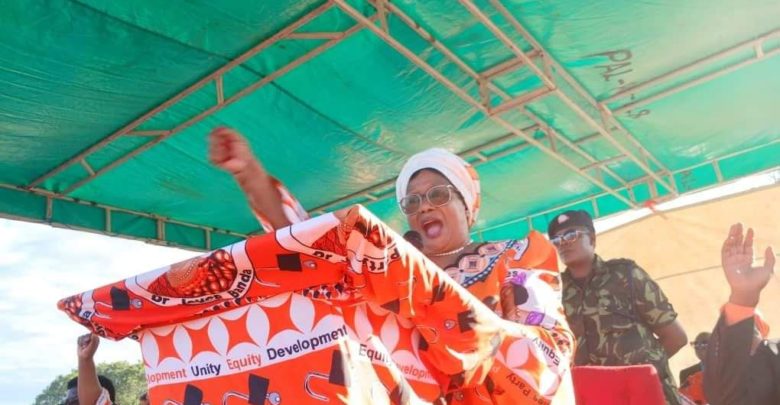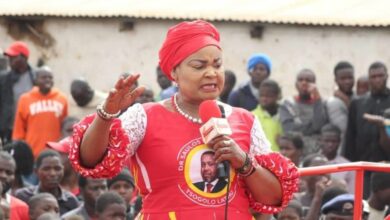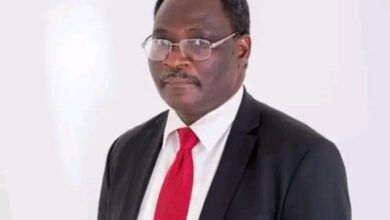Columns
Cashgate Chronicles: The Rise and Ruin of Joyce Banda’s Presidency

By Twink Jones Gadama
In the small African nation of Malawi, the term “cashgate” became synonymous with corruption and betrayal during former President Joyce Banda’s tumultuous reign. Banda, once hailed as a beacon of hope for the country, found herself embroiled in a scandal that rocked the nation to its core and led to her self-imposed exile.
The cashgate scandal was a brazen display of theft and deception that saw billions of Malawian Kwacha stolen from government coffers. The scheme involved government officials and businessmen colluding to siphon off funds meant for public projects and services, leaving the citizens of Malawi to suffer the consequences of their greed.

At the center of the scandal was Joyce Banda, the first female president of Malawi, who ascended to power in 2012 following the sudden death of her predecessor. Banda was initially celebrated for her promises to root out corruption and improve the lives of Malawians, but her tenure was marred by allegations of embezzlement and fraud.
As the extent of the corruption became clear, Banda’s administration came under intense scrutiny from the Malawian people and international donors. The pressure mounted as evidence of her involvement in the cashgate scandal began to surface, implicating her in the looting of government funds.
In 2014, Banda’s party was defeated in the presidential election by Peter Mutharika and his Democratic Progressive Party (DPP). The new government wasted no time in launching an investigation into the cashgate scandal and pursuing those responsible for the theft.
Banda, facing mounting legal challenges and public outcry, made the decision to go into self-imposed exile, fleeing the country to escape the growing scandal. For nearly four years, she lived in exile, evading scrutiny and avoiding accountability for her role in the theft of public funds.
During her time in exile, Banda remained a polarizing figure in Malawian politics, with some supporters defending her actions and others condemning her betrayal of the public trust. The legacy of cashgate and Banda’s involvement in the scandal continued to haunt the nation, casting a shadow over its efforts to rebuild and move forward.
In 2018, Banda returned to Malawi, seeking to reenter the political arena and clear her name of the allegations against her. However, the stain of cashgate proved difficult to overcome, and Banda struggled to regain the trust and support of the Malawian people.
Today, the legacy of the cashgate scandal and Joyce Banda’s exile serve as a cautionary tale for the perils of unchecked corruption and the need for accountability in governance. The wounds inflicted by the theft of public funds may never fully heal, but the people of Malawi continue to strive for transparency, integrity, and justice in their leaders.
*Peter Mutharika: A Crusader Against Corruption in Malawi*
Peter Mutharika emerged as a formidable force against corruption during his tenure as the President of Malawi. His leadership was marked by a fervent commitment to upholding integrity and accountability, making significant strides in holding accountable those who plundered the nation’s resources.
Mutharika’s presidency was characterized by a relentless pursuit of justice and transparency. He spearheaded anti-corruption initiatives that aimed to root out systemic corruption within the government and beyond. Under his administration, several high-profile individuals implicated in looting Malawi’s coffers were brought to justice, sending a powerful message that impunity would not be tolerated.
One of the key pillars of Mutharika’s anti-corruption crusade was the strengthening of institutions responsible for combating graft. He championed reforms aimed at enhancing the capacity and independence of anti-corruption agencies, enabling them to more effectively investigate and prosecute cases of corruption. By bolstering these institutions, Mutharika sought to create a conducive environment for accountability and the rule of law to thrive.
Furthermore, Mutharika’s efforts to combat corruption extended beyond domestic borders. He actively engaged with regional and international partners to foster cooperation in tackling transnational corruption and money laundering. Through these collaborations, Mutharika sought to close off avenues used by corrupt individuals to siphon off public funds and evade justice.
Despite facing challenges and resistance from vested interests, Peter Mutharika remained steadfast in his commitment to fighting corruption. His legacy as a crusader against graft serves as a testament to the enduring importance of integrity and accountability in governance. As Malawi continues its journey towards a more transparent and accountable society, the impact of Mutharika’s anti-corruption efforts continues to resonate, inspiring future generations to uphold the values of honesty and ethical leadership.
The Chakwera Conundrum: unveiling Tolerance for corruption
Since assuming office, Lazarus Chakwera, the President of Malawi, has been under scrutiny for his alleged involvement with corruption, particularly his association with Joyce Banda, who was embroiled in the infamous cash gate scandal. This partnership has raised concerns among citizens and critics alike, questioning Chakwera’s stance on combating corruption within his administration.
The collaboration between Chakwera and Joyce Banda, a figure tainted by corruption allegations, from the onset of his presidency has cast a shadow over his commitment to upholding transparency and accountability. Despite the promises of a corruption-free government, the failure to address or display any inclination to pursue the suspects involved in the cash gate scandal has fueled suspicions of complicity and tolerance towards corrupt practices.
Chakwera’s reluctance to confront the ghosts of corruption haunting his administration has not only undermined the public’s trust but has also reinforced the perception that he may be turning a blind eye to malfeasance within his ranks. The lack of decisive action against individuals implicated in corruption scandals, including Joyce Banda, serves as a testament to the notion that Chakwera’s administration may not be as committed to eradicating corruption as initially proclaimed.
Furthermore, the absence of concrete steps to hold accountable those involved in corrupt activities has led to a growing disillusionment among the populace, who had placed their hopes in Chakwera’s promise of a clean and transparent government. The perceived inaction in addressing corruption allegations raises questions about the sincerity of Chakwera’s anti-corruption rhetoric and his ability to lead by example in fostering a culture of integrity and accountability.
The partnership with Joyce Banda and the perceived lack of initiative in addressing corruption within his administration have cast doubts on Lazarus Chakwera’s commitment to combating corrupt practices. The failure to pursue suspects in the cash gate scandal, including Joyce Banda, has raised concerns about his integrity and willingness to uphold ethical standards in governance. If Chakwera wishes to regain public trust and credibility, he must demonstrate a firm stance against corruption and take decisive actions to root out malfeasance within his government.
President Chakwera Father of corruption
President Chakwera finds himself embroiled in a web of corruption allegations, with accusations of championing corrupt practices and threatening the Anti-Corruption Bureau. The spotlight is now on his alleged dubious deals with Zuneth Satar, a case that despite overwhelming evidence, seems to be dragging on, raising questions about the delay in justice.
The accusations against President Chakwera have painted a grim picture, with some even going as far as dubbing him the “Father of Corruption” alongside former president Joyce Banda. This revelation has sent shockwaves through the nation, as Malawians grapple with the implications of having their leader implicated in such serious allegations.
However, amidst these dark clouds, there is a glimmer of hope. Peter Mutharika stands out as the only president in Malawi’s history who boldly stood against corruption, sending a clear message to the world that such practices will not be tolerated in his administration. His stance serves as a beacon of integrity and transparency in a sea of corruption allegations that now cloud President Chakwera’s tenure.
As the nation waits for answers and justice to prevail, the future of President Chakwera hangs in the balance. Will he be able to clear his name and restore faith in his leadership, or will these allegations mark the beginning of a tumultuous chapter in Malawi’s political history? Only time will tell as the saga unfolds.






